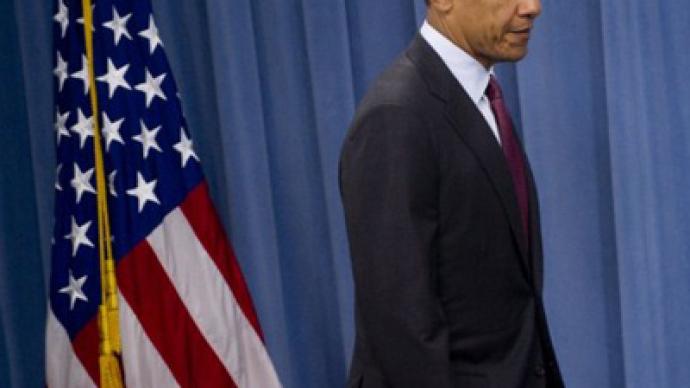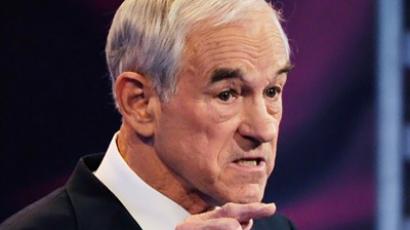ACLU trashes Obama over indefinite detention and torture act

“He will forever be known as the president who signed indefinite detention without charge or trial into law.”
These harsh words come courtesy of the executive director of the ACLU, formerly a supporter of the president but also just one of the many dissenters who have since have grown disillusioned with an administration tarnished by unfulfilled campaign promises and continuous constitutional violations. When he signed the National Defense Authorization Act on New Year’s Eve, President Barack Obama said that he had his reservations over the controversial legislation that will allow for the indefinite detention of Americans.Now some of the president’s pals are expressing their agreement with Obama’s own hesitation but say that the commander-in-chief should have thought harder before signing away the civil liberties of Americans.Under the bill, which approves all defense spending for the 2012 fiscal year, certain provisions allow for the military detainment and torture of US citizens, indefinitely, essentially allowing for Guantanamo Bay-style prisons to be a real possibility for every American. As the act floated around Congress, an underground outrage erupted and activists attempted to keep the bill from leaving the House and the Senate, although a lack of media coverage largely left the matter hidden to the public. Despite this campaign, the legislation made it out of the Capitol Building and into the Oval Office last month, prompting advocates against the act to petition for the president to veto it.Initially the Obama administration said the president’s advisers would recommend a veto, but later rescinded the threat. Senator Carl Levin eventually revealed that President Obama had insisted on adding the wording that has made NDAA such a target among activists who are frightened of the civil liberty-stripping capabilities. One week after the president did ink the legislation, some of Obama’s old pals are saying they are in disbelief over how a former constitutional law professor could agree to such provisions that crush the law of the land."President Obama's action … is a blight on his legacy because he will forever be known as the president who signed indefinite detention without charge or trial into law," ACLU Executive Director Anthony Romero says in a statement. Such a charge not only carries much clout because it comes courtesy of the head of such an integral and reputable advocacy group, but Romero himself was praising the president three years earlier after he won the 2008 election. Now that same administration is doing everything Romero thought it wouldn’t.“I believe he knows what he needs to do to restore the America we believe in, to get us on back on track, to give us back our America, an America we never stopped believing in but have sorely missed for the past eight years,” Romero wrote in 2008 in an op-ed that encouraged the president to follow through on his campaign promise of closing Guantanamo Bay. “Call me naive, but I honestly believe he wants to do it. He promised us that on the campaign trail, and I believe it was more than an empty promise,” wrote Romero.Three-quarters of the way through his presidency, Obama has now only left Gitmo remain open, but is going to be able to send his own citizens to its torture cells. “We are incredibly disappointed that President Obama signed this new law even though his administration had already claimed overly broad detention authority in court,” adds Romero. “Any hope that the Obama administration would roll back the constitutional excesses of George Bush in the war on terror was extinguished today.”Other groups who had previously offered their endorsement to the president are saying they are upset as well."It is deeply troubling that the NDAA became law with the detention provisions intact,” reads a statement from the Council on American-Islamic Relations, or CAIR. “We believe it is unconstitutional for our military to become a police force that would hold American citizens indefinitely without the right to trial or even to hear the charges brought against them."CAIR had long supported Obama for his protection of Muslim-American rights. Nearly one year ago Executive Director Nihad Awad told the media that the group welcomes Obama for his “decision to emphasize the fact that Muslims are contributing members of our society.” Only 12 months later, the group says they are now skeptical over how the president can now use his power to strip the rights of anyone."This ill-conceived and un-American legislation will forever be seen as a stain on our nation's history – one that will ultimately be viewed with embarrassment and shame,” adds the advocacy group.Although the powers of the act indeed offer the president the ability to indefinitely detain people, citizens or non, Obama said during signing that he would not interpret the legislation to mean as such. “I want to clarify that my Administration will not authorize the indefinite military detention without trial of American citizens,” added the president in a statement that accompanied the signing of NDAA. “My Administration will interpret section 1021 in a manner that ensures that any detention it authorizes complies with the Constitution, the laws of war, and all other applicable law.” That memo does not, however, mean future heads of state will necessarily be excluded from following the orders authorized by Congress. In fact, the ACLU’s Romero tells The Atlantic, "The statute is particularly dangerous because it has no temporal or geographic limitations, and can be used by this and future presidents to militarily detain people captured far from any battlefield.”“President Obama did pledge in a signing statement not to use this law to detain American citizens but this provides little comfort, as signing statements have no legal force and he has repeatedly failed to uphold similar promises in the face of political pressure — including his pledge to close Guantánamo within his first year in office,” adds the Center for Constitutional Rights in their own statement this week. “The law authorizes a future president, such as a President Romney, President Bachmann or President Perry, to use this authorization in the most aggressive manner available.When he offered his John Hancock come signing time, the president acknowledged suspicious but went ahead with it anyway, noting, “The fact that I support this bill as a whole does not mean I agree with everything in it. In particular, I have signed this bill despite having serious reservations with certain provisions that regulate the detention, interrogation, and prosecution of suspected terrorists.”“I guess promising that Americans wouldn't be indefinitely detained, period, was too much of a stretch,” blogger Mary Wheeler adds.Those very suspicions that Obama wrote of did not stop the president from following the plea of Congress though, less than a year until November elections make or break the legacy of the president.If you ask many, though, that legacy has been tarnished by the NDAA.“Our Founders were fearful of the military — and they purposely created a system of checks and balances to ensure we did not become a country under military rule,” Minnesota Senator Al Franken wrote of the bill on Huffington Post. Franken, a Democrat along with Obama, said he had agreed with parts of the bill but the controversial provisions alone were reason for him not to sign it.“This bill undermines that core principle, which is why I could not support it.”For Obama, that didn’t quite seem to matter as much.














